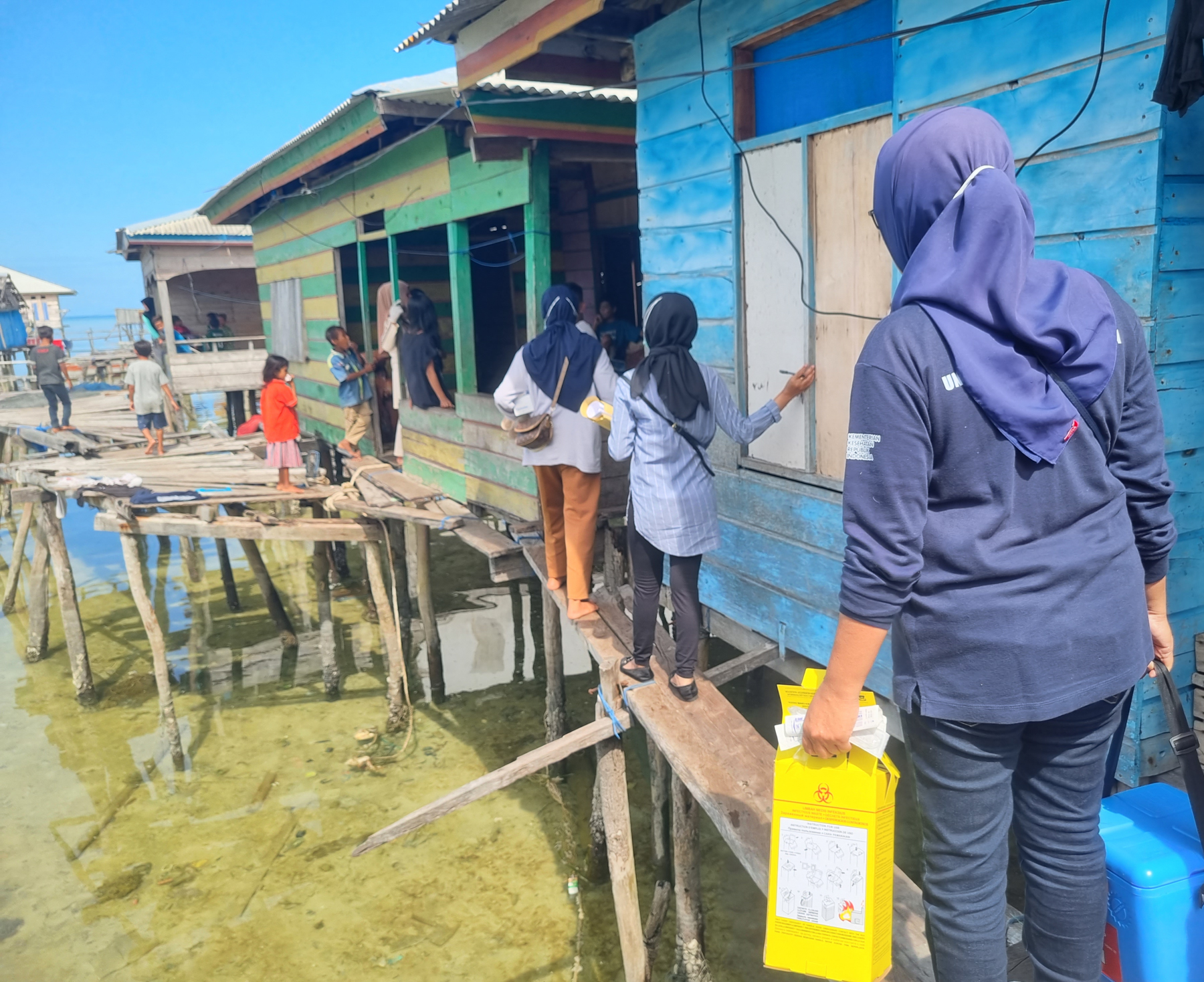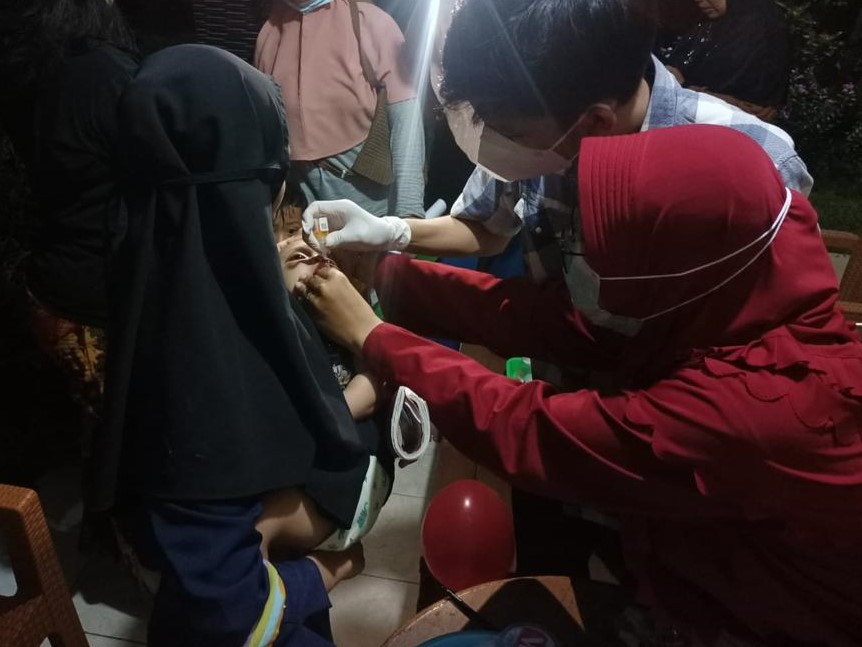Catchup vaccination campaigns are critical to control and prevent disease outbreaks. Health workers across Indonesia face a range of challenges when it comes to ensuring that vaccination services reach unvaccinated children. These span geographical distance, concerns about vaccine safety, and a lack of awareness of disease outbreaks in these areas. Bodi Fatwa, an immunization coordinator in Muna District, Southeast Sulawesi, and Vitri Agustini, her counterpart in Depok City, West Java, have been battling unique challenges in their respective regions.
Muna district health officials officially declared a measles outbreak in Tanjung Batu sub-district on 14 June 2023. This followed a surge a surge in measles cases, with 30 children affected and one fatality reported in April-May 2023. The potential for outbreaks of these vaccine-preventable diseases was exacerbated by the number of under-immunized children. However, parents and families living on Pasikuta Island, nestled in Southeast Sulawesi province, have trouble reaching healthcare facilities as the nearest primary healthcare center (Puskesmas) is a two-hour boat ride away . In Depok City, a polio outbreak had been plaguing West Java province since February 2023. Yet, many parents and communities were unaware of the outbreak and the dire consequences of not vaccinating their children against this perilous disease. These dire situations demanded innovative and tailored solutions.

Walking above water, a vaccination team conducts home visits as part of a measles vaccination campaign in Pasikuta Island. Credits: WHO/Muh. Afdhal
From May through to June 2023, WHO and local health authorities conducted field visits to Puskesmas while officials from the Muna district health office (DHO) provided coaching and mentoring support to health workers in Muna and Depok. Discussions and collaborations with vaccinators, healthcare workers, civil society organizations and community leaders led to initiatives to strengthen routine immunization services and catch-up vaccination campaigns.
In Pasikuta, vaccine hesitancy prompted people to leave the island whenever campaigns began. WHO and local health authorities engaged the community in an informal way. They showed videos and organized discussions about measles during a music and dance event held one day before the vaccination campaign. In addition, during the vaccination campaign, key community figures such as security personnel (babinsa and binmas), police, health cadres, heads of sub-districts and villages, and teachers formed groups to visit homes of unvaccinated children. This approach proved to be effective in delivering face-to-face health promotion messages and in increasing the vaccination rate on the island. The measles vaccination campaign successfully vaccinated 212 children, or 96.2% of the targeted population in Pasikuta.
“It was our first time being involved in the vaccination process. We hope after this campaign we can have regular multisectoral meetings with the Puskesmas to address the barriers to healthcare in our area, including the immunization programme,” said Musyafi Emil Tabah Ndeho, Head of Marobo Sub-district, during the coordination meeting following the Outbreak Response Immunization (ORI) campaign in Pasikuta Island.

In a high mobility area of Depok City, the Puskesmas Limo team did an evening sweep to reach children whose parents are working during the day. Credits: WHO/Wildan Mochamad Ridho
In Depok, WHO and health officials in Limo sub-district conducted home visits for a different reason. Due to its proximity to Jakarta, a large number of people from Depok commute to the capital city on a daily basis. The busy commute and high mobility mean that many parents in Depok experience challenges in seeking care for their children, including vaccinations. Moreover, many parents were unaware of the ongoing polio outbreak in West Java province. Therefore, vaccination teams conducted home visits in the afternoon until late in the evening in Limo sub-district, where vaccination rates were lowest. This ensured that the teams would meet the parents when they arrived home after a day of work. Before vaccinating the children, the team explained the importance of routine immunization and the safety of multiple injections to the parents. This tactic resulted in around 50 out of 282 children being vaccinated in Limo during the campaign.
According to Vitri, “Immunization outreach in areas with high mobility is a challenge in itself. Our team tries its best to ensure that all babies and toddlers receive optimal protection through complete and catch-up immunization.”
By involving local leaders and community figures who enjoy the trust of the people, perceptions about immunization began to shift. This approach not only fostered stronger emotional connections between healthcare workers and parents but also unearthed valuable insights into their concerns and grievances. In Depok, evening home visits proved highly effective in reaching working parents and safeguarding more children from vaccine-preventable diseases.
The success of these initiatives highlights the importance of engaging multiple stakeholders and tailoring efforts to the local context. Encouraged by this success, Bodi Fatwa is committed to continue this approach in Muna. Other villages in Muna are considering replicating the approach. Meanwhile, Puskesmas Limo plans to expand evening home visits, ensuring that no child is left behind in future immunization campaigns. This initiative demonstrates that even the most challenging vaccination hurdles can be overcome with determination and innovative strategies.
These activities are supported by the Government of the United States through USAID and US CDC.
Written by Wildan Mochamad Ridho and Muhammad Afdhal, Vaccination Technical Officers, WHO Indonesia
